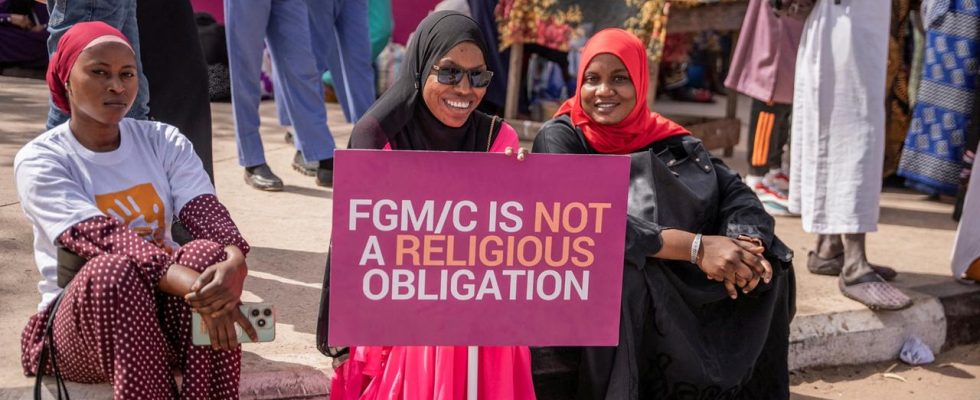Female genital mutilation, also known as circumcision, has been banned in Gambia since 2015. Parliament is now discussing withdrawing the law. Women’s rights activists across West Africa are sounding the alarm.
In mid-March it became deafeningly loud in front of Gambia’s parliament: opponents and supporters of female genital mutilation tried to drown each other out with their chants. And with their calls – which, from the opponents’ point of view, are nothing more than “emergency calls”: We are here to make it clear that this law must not be abolished. Because that would have health consequences for women and young girls in this country,” explains Juana Mendy, who fights for women’s rights with the help of a “network against gender-based violence”.
The serious damage and torment – mental and physical – that genital mutilation can cause has been sufficiently medically proven. Which is why it is banned internationally.
MP Almameh Gibba, however, argued in parliament that the ban prevented the majority Muslim population from freely practicing their culture and religion: “Circumcision is a culturally important practice that is supported by the values and tradition of Islam.”
Women’s rights activists around the world, however, constantly point out that the bloody intervention has neither its roots nor any other basis in the Koran. Yes, the practice can even be described as “un-Islamic”.
“A more indescribable regression”
Nevertheless, clerics in Gambia are also trying to brand the ban, which has been in place since 2015, as a violation of religious rules: When three women were convicted in court for the first time a few months ago for mutilations they had carried out, an imam was immediately on the scene, who offered, both willingly and publicly, to pay the fines.
But the Senegalese activist Safiétou Diop Fall also explains: The Koran does not prescribe mutilation. If the practice were to remain unpunished in the future, it would be a catastrophe: “It is an indescribable step backwards. A setback in the advocacy of women’s rights and their acceptance” – which cannot be justified by anything, as she emphasizes.
Fear of sending a signal to other countries
Although the serious attack on the female body is punishable in Gambia, it continues to take place in secret. According to statistics, around three quarters of all girls and women between the ages of 15 and 49 are circumcised. There are also mothers who support the practice because they believe it will make it easier for their daughters to get married – which is why, according to experts, it is primarily educational campaigns that can help.
But if the ban on mutilation in Gambia is overturned, there are concerns that this could lead to a whole cascade of further measures and roll back hard-won gains in equality for women – and could have a ripple effect throughout West Africa by inciting advocates of the brutal practice in other countries , warns activist Fall from the neighboring state of Senegal.
President Barrow remains silent
According to UN estimates, more than 200 million women and girls worldwide have endured the ordeal. British Foreign Secretary David Cameron tweeted to Gambia that “the world is watching.” The country has actually committed itself to the protection of women and children through international agreements.
So far, however, this kind of pressure has not resulted in Gambia’s president, Adama Barrow, taking a clear stance against female genital mutilation, much to the West’s chagrin. But that’s exactly what parliamentarian Gibbi Mballow is doing: “I swore on the Koran that I will pursue the interests of this country. And this law is directed against the interests of this country. And that’s why it must be stopped,” the politician tried to his parliamentary colleagues – accompanied by violent blows on the lectern – almost hammered into place.
First of all, the bill to revoke the ban has now been referred to a parliamentary committee – so that further arguments can be heard there. But he is not stopped – or “killed” – as MP Mballow would like. Because afterwards there should be another vote. The danger that Gambia will embark on a disastrous journey into the past has by no means been averted.
Kai Küstner, ARD Rabat, tagesschau, April 10, 2024 12:37 a.m

